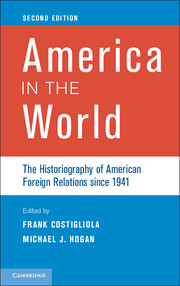Book contents
- Frontmatter
- Dedication
- Contents
- List of Contributors
- Preface
- 1 Introduction
- 2 The Charlie Maier Scare and the Historiography of American Foreign Relations, 1959–1980
- 3 Chaps Having Flaps: The Historiography of U.S. Foreign Relations, 1980–1995
- 4 Still Contested and Colonized Ground: Post–Cold War Interpretations of U.S. Foreign Relations during World War II
- 5 Recent Literature on Truman’s Atomic Bomb Decision
- 6 The Cold War
- 7 Cold War Presidents: Dwight D. Eisenhower, John F. Kennedy, Lyndon Baines Johnson, and Richard M. Nixon
- 8 The War that Never Ends: Historians and the Vietnam War
- 9 Culture and the Cold War: U.S.–Latin American Historiography since 1995
- 10 Impatient Crusaders: The Making of America’s Informal Empire in the Middle East
- 11 Explaining the Rise to Global Power
- 12 Bringing the Non-State Back In
- 13 Technology and the Environment in the Global Economy
- 14 U.S. Mass Consumerism in Transnational Perspective
- 15 A Worldly Tale
- Index
- References
10 - Impatient Crusaders: The Making of America’s Informal Empire in the Middle East
Published online by Cambridge University Press: 05 June 2014
- Frontmatter
- Dedication
- Contents
- List of Contributors
- Preface
- 1 Introduction
- 2 The Charlie Maier Scare and the Historiography of American Foreign Relations, 1959–1980
- 3 Chaps Having Flaps: The Historiography of U.S. Foreign Relations, 1980–1995
- 4 Still Contested and Colonized Ground: Post–Cold War Interpretations of U.S. Foreign Relations during World War II
- 5 Recent Literature on Truman’s Atomic Bomb Decision
- 6 The Cold War
- 7 Cold War Presidents: Dwight D. Eisenhower, John F. Kennedy, Lyndon Baines Johnson, and Richard M. Nixon
- 8 The War that Never Ends: Historians and the Vietnam War
- 9 Culture and the Cold War: U.S.–Latin American Historiography since 1995
- 10 Impatient Crusaders: The Making of America’s Informal Empire in the Middle East
- 11 Explaining the Rise to Global Power
- 12 Bringing the Non-State Back In
- 13 Technology and the Environment in the Global Economy
- 14 U.S. Mass Consumerism in Transnational Perspective
- 15 A Worldly Tale
- Index
- References
Summary
The rise of communism in our world is comparable to the rise of Islam and its challenge of Christian civilization in the high Middle Ages. Some of the measures we take against it are informed by the same lack of realism which characterized the Crusades. The Islamic power finally waned. It was destroyed not so much by its foes as by its own inner corruptions. The Sultan of Turkey found it ultimately impossible to support the double role of political head of a nation and the spiritual head of the Islamic world. Stalin has this same double role in the world communist religion. He or his successors will finally be convicted of insinuating the power impulses of a Russian state into the Messianic illusions of an ostensibly world-wide political religion. If we fully understand the deep springs which feed the illusions of this religion, the nature of the social resentments which nourish them and the realities of life which must ultimately refute them, we might acquire the necessary patience to wait out the long run of history while we take such measures as are necessary to combat the more immediate perils.
– Reinhold Niebuhr, 1952New York City was unseasonably warm in January 1952 when Reinhold Niebuhr – pastor, political activist, and public intellectual – sat down in his study at Union Theological Seminary to ponder the Cold War. As he put the finishing touches on The Irony of American History, the fifty-nine-year-old Middle Westerner marveled at America’s rapid emergence as a superpower, but he also worried that those who regarded the United States as an “innocent nation in an innocent world” were in for a rude awakening in Europe, Asia, and the Middle East. Niebuhr was convinced that if Americans remained patient, the current communist threat to democracy would, like the Islamic challenge to Christianity during the Middle Ages, gradually disappear, “destroyed not so much by its foes as by its own inner corruptions.”
- Type
- Chapter
- Information
- America in the WorldThe Historiography of American Foreign Relations since 1941, pp. 212 - 235Publisher: Cambridge University PressPrint publication year: 2013

